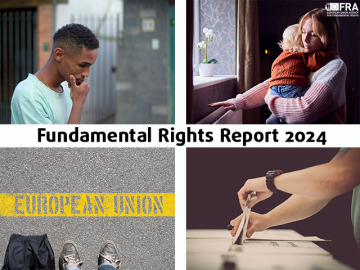FRA’s Fundamental Rights Report 2024 focuses on key developments and shortfalls of fundamental rights protection in the EU in 2023. These include:
- Greater poverty: rising energy and living costs have pushed 1 in 5 people across the EU into poverty. Despite national poverty reduction measures, children and vulnerable households, like those in single-parent, Roma and migrant families, are most at risk.
- New migration rules offer stronger rights protection at EU borders but also raise new risks: in 2024, the EU agreed new migration and asylum rules for a more effective processing of asylum application at the EU’s borders. New rules on fundamental rights monitoring, child protection and a clear duty to investigate all substantiated reports of rights violations offer opportunities to improve compliance with fundamental rights, if fully implemented. In 2023, over 4,000 people died or went missing at sea, the highest number in the last five years.
- Democratic threats: excessive State interventions, particularly against the rights to freedom of association, peaceful assembly and expression, threatened the space for civil society. This, combined with a lack of meaningful engagement in public affairs and disinformation, are undermining democracy across Europe.
- Rising antisemitism: the terrorist attacks by Hamas in Israel on 7 October 2023 and Israel’s military response in Gaza triggered an alarming rise in threats and violence against Jews across the EU. The rise of antisemitic hatred and violence evoked horrifying memories across the continent.
- Increasing intolerance: intolerance is growing across Europe, affecting many groups, including Muslims, people of African descent, Roma, and migrants. Disinformation and online platforms have exacerbated racist and polarised attitudes.
- Wider digital divides: The greater use of artificial intelligence (AI) and the digitalisation of public services risks leaving behind vulnerable groups like older people, people with disabilities, the homeless and Roma. Legislative developments, including the EU’s Artificial Intelligence Act and Digital Services Act, as well as the Council of Europe AI convention, aim to address some of those challenges.
To address such challenges, FRA calls on the EU and EU countries to:
- Leave no-one behind: ensure that poverty and energy reduction measures, including social and housing assistance, reach disadvantaged groups.
- Strengthen fundamental rights safeguards at borders: improve search and rescue practices to save lives at sea. Provide safer conditions for processing new arrivals, and establish independent rights monitoring at the EU’s external borders.
- Protect civil society: monitor and record restrictions to civic space. Take action to protect human rights defenders and media freedom. Systematically call on civil society expertise, allowing meaningful time for effective consultation.
- Take a firm stand against all forms of racism and related intolerance: acknowledge and counter systemic and deeply rooted racism and related intolerance in our societies. Continue to monitor and collect evidence-based data to feed into EU and national anti-racism and antisemitism laws and policies. Provide a safer online space for all and act against online hate.
Quote from FRA Director Sirpa Rautio:
“Polarisation across Europe is leading to widespread intolerance, creating divided societies with many groups suffering. Rising poverty and democratic threats are further fuelling uncertainty and societal tensions. But Europe also has a strong foundation in human rights which can guide our actions. We should all pull together and work to our strengths to ensure a secure and inclusive future that respects the rights of all where everybody feels safe to be who they are.”
For more, please contact: media@fra.europa.eu / Tel.: +43 1 580 30 653
